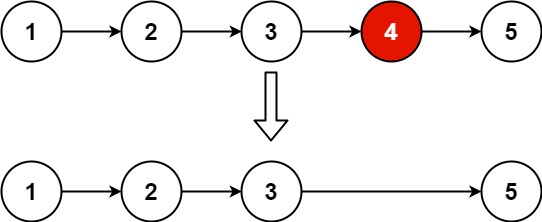题目信息
-
Given the
headof a linked list, remove then<sup>th</sup>node from the end of the list and return its head.Example 1:

Input: head = [1,2,3,4,5], n = 2 Output: [1,2,3,5]Example 2:
Input: head = [1], n = 1 Output: []Example 3:
Input: head = [1,2], n = 1 Output: [1]Constraints:
- The number of nodes in the list is
sz. 1 <= sz <= 300 <= Node.val <= 1001 <= n <= sz
Follow up: Could you do this in one pass?
- The number of nodes in the list is
-
描述:
- 给你一个链表,删除链表的倒数第 n 个结点,并且返回链表的头结点。
解题思路
- 想要删除倒数第N个结点,只需要获取倒数第N+1个结点的指针p即可完成链表删除操作
计算链表长度(容易想到)
- 假设链表总长度为L,倒数第N个结点就是正数第
L-N+1个结点,我们需要的p就是正数第L-N个结点
快慢指针
- 快慢指针: 分别使用快指针fast和慢指针slow,fast先遍历到N+1个结点,之和和在头结点的slow同时开始遍历,当fast到链表尾时,slow就处在倒数第N+1个结点了
- 相当于fast先走了N+1,这样fast到终点时,slow距离终点还差N+1,即slow处在倒数N+1个节点的位置
删除链表节点
- 删除p的下一个节点:
p.next = p.next.next - 另外需要注意如果需要移除头结点可以使用 Dummy Node
代码
计算链表长度
# class ListNode:
# def __init__(self, val=0, next=None):
# self.val = val
# self.next = next
class Solution:
def removeNthFromEnd(self, head: ListNode, n: int) -> ListNode:
p = head
l = 0
# get the length of the linked list L
while p != None:
l += 1
p = p.next
# find the L-N node's pointer
# then remove the L-N+1 node
if l-n == 0:
# if l-n == 0, remove head node
dummy = ListNode()
dummy.next = head
p = dummy
p.next = p.next.next
return dummy.next
cnt = 0
p = head
while p != None:
cnt += 1
if cnt == l-n:
# current p points to L-N
p.next = p.next.next
break
p = p.next
return head
快慢指针
# Definition for singly-linked list.
# class ListNode:
# def __init__(self, val=0, next=None):
# self.val = val
# self.next = next
class Solution:
def removeNthFromEnd(self, head: ListNode, n: int) -> ListNode:
# find (N+1)th from the end of the list
dummy = ListNode(next=head)
fast, slow = dummy, dummy
# fast pointer start from n+1 nodes ahead
for _ in range(n+1):
fast = fast.next
# slow is the target node when fast points to the end
while fast is not None:
slow = slow.next
fast = fast.next
# remove node
# n>=1 slow is at least the 2nd node from the end, slow.next will not be None
slow.next = slow.next.next
return dummy.next